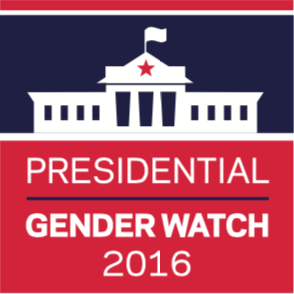Why This Double Standard Is Beyond Words
 In April 2015, the Barbara Lee Family Foundation (BLFF) and the Center for American Women and Politics (CAWP) launched Presidential Gender Watch 2016, a project to track, analyze, and illuminate gender dynamics in the 2016 presidential election. With the help of expert scholars and practitioners, Presidential Gender Watch worked for 21 months to further public understanding of how gender influences candidate strategy, voter engagement and expectations, media coverage, and electoral outcomes in campaigns for the nation’s highest executive office. The blog below was written for Presidential Gender Watch 2016, as part of our collective effort to raise questions, suggest answers, and complicate popular discussions about gender’s role in the presidential race.
In April 2015, the Barbara Lee Family Foundation (BLFF) and the Center for American Women and Politics (CAWP) launched Presidential Gender Watch 2016, a project to track, analyze, and illuminate gender dynamics in the 2016 presidential election. With the help of expert scholars and practitioners, Presidential Gender Watch worked for 21 months to further public understanding of how gender influences candidate strategy, voter engagement and expectations, media coverage, and electoral outcomes in campaigns for the nation’s highest executive office. The blog below was written for Presidential Gender Watch 2016, as part of our collective effort to raise questions, suggest answers, and complicate popular discussions about gender’s role in the presidential race.
You can learn a lot from watching movies. Never underestimate a woman just because she wears heels (Legally Blonde). Don’t let fear run your life (Frozen). Meryl Streep is the best (every movie she’s made).
However, films don’t always get it right. There have only been nine female presidents portrayed on the big screen. Nine. Maybe it’s the lack of gender diversity in Hollywood, but, during a crisis, the U.S. always seems to have a male president who isn’t afraid to let his language get salty when standing up for American values. As my colleague at Presidential Gender Watch, Rutgers University professor Kelly Dittmar, has written, the position of commander-in-chief is laced with gender expectations. Whether aliens are attacking (Independence Day) or terrorists are taking over (Air Force One), Hollywood’s most popular presidents are men who curse when they mean business.
In the current presidential race, male candidates seem to be taking their cues from the movies — or maybe this is an example of art imitating life. Profanity is nothing new in presidential politics, but Matt Flegenheimer and Maggie Haberman at the New York Timespoint out that the 2016 race has seen an uptick in foul language. Donald Trump is going to “bomb the sh*t” out of ISIS, Chris Christie thinks President Obama has done some “stupid sh*t” in the foreign policy department, and Rand Paul thinks it’s “bullsh*t” to compromise personal liberties for security. With a smattering of FCC-permitted “hell”s, “damn”s, and “crap”s from male candidates included in the mix, it’s safe to say that I’m not going to let my small children watch political TV any time soon. That means a lot of early bedtimes with a Republican debate, a Democratic debate, and the State of the Union coming up next week.
Flegenheimer and Haberman also noted in their piece that we aren’t seeing the same language from the women running for president. This is no surprise. As the Wall Street Journal points out, a well-timed curse by a male leader can be seen as evidence of his authentic leadership style, but it’s a greater risk for a woman to swear because women are held to a higher standard. We see examples of this all of the time: remember when Mike Huckabee said it was “just trashy” for women to curse in the workplace? Or when Supreme Court Justice Antonin Scalia was upset that in modern society even “ladies” swear?
The double standard is exhausting, especially because penalizing women for cursing doesn’t mean people won’t curse at them. As Carly Fiorina aptly put it in the December GOP debate, powerful women often get called “every B-word in the book.”
Two decades of nonpartisan Barbara Lee Family Foundation research on women running for executive office tells us that voters still hold complex views about women candidates. Voters often require women to navigate a road to office that is littered with gender stereotypes and biases. While feminists are gradually claiming historically masculine profanities to tell our own stories, it’s still unlikely that Hillary Clinton or Fiorina would get the same response as male candidates if they were to drop a four-letter word.
There’s no doubt that words matter in political campaigns, and the fact that male candidates get more words in their arsenals? There’s an expletive for that, too.

